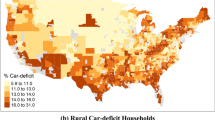Abstract
The p-median model locates facilities to provide optimal service to target populations. Where, for some reason, an inappropriate variable is used to stand in for a target population's demand, less than ideal facility systems can result. This effect is termed surrogation error. In this paper, I introduce this concept and perform an experiment which, with data for 25 Canadian cities, demonstrates that significant surrogation error can occur if general population is used in place of children or senior populations. I identify some of the correlates of surrogation error and conclude with a warning to location scientists to be conscious of, and to try to avoid, this problem.
Similar content being viewed by others
References
P. Hanjoul and D. Peeters, A comparison of two dual-based procedures for solving the p-median problem, European Journal of Operational Research 20 (1985) 387-396.
M.J. Hodgson, Stability of the p-median model under induced data error, INFOR 29 (1991) 167-183.
R.A.Murdie, Factorial ecology of Metropolitan Toronto, 1951-1961, Department of Geography, University of Chicago (1969).
M.B. Teitz and P. Bart, Heuristic methods for estimating the generalized vertex median of a weighted graph, Operations Research 16 (1968) 955-961.
Author information
Authors and Affiliations
Rights and permissions
About this article
Cite this article
Hodgson, M.J. Data Surrogation Error in p-Median Models. Annals of Operations Research 110, 153–165 (2002). https://doi.org/10.1023/A:1020771702141
Issue Date:
DOI: https://doi.org/10.1023/A:1020771702141



